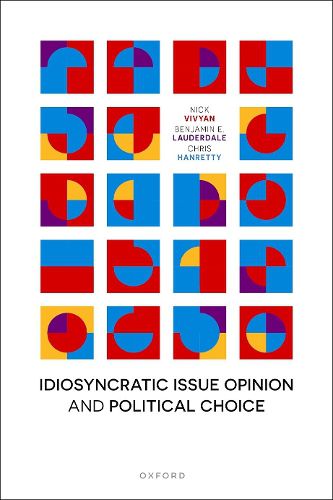Readings Newsletter
Become a Readings Member to make your shopping experience even easier.
Sign in or sign up for free!
You’re not far away from qualifying for FREE standard shipping within Australia
You’ve qualified for FREE standard shipping within Australia
The cart is loading…






What is the nature of mass opinion on public policies? And what role do citizens' positions on policy issues play in their political choices? This book re-examines these questions, which lie at the heart of fundamental debates about whether democratic elections make policymakers responsive to citizens' policy preferences. The answers that political science currently provides to these questions tend to reflect one of two contrasting perspectives. The 'ideological voter' account suggests that citizens' opinions across different policies are organised well enough by ideology that political choice reduces to comparing positions on a small number of ideological dimensions, often characterised as an economic left-right dimension and a social liberal-conservative dimension. This simplifies democratic policy responsiveness. The 'innocent voter' account, by contrast, suggests that most citizens lack meaningful policy opinions on most issues. They express policy opinions that lack stability and ideological organisation, except where they simply mimic the policies espoused by the parties they support. This severely limits the prospects for democratic policy responsiveness.
This book argues for a third perspective: an 'idiosyncratic voter' account. This says that citizens develop meaningful and stable policy opinions on different sets of issues, but the combinations of policy opinions they form on these issues are often idiosyncratic rather than ideologically organised. Drawing on data from a large panel survey conducted in Britain in 2018-19, the authors show that both the ideological voter and innocent voter accounts explain important aspects of mass policy opinion and the degree of impact it has on individuals' political choices. Nonetheless, idiosyncratic policy opinion is widespread on many issues and significantly shapes the political choices that individuals make. As such, idiosyncratic policy opinion serves alongside ideological policy opinion as an additional starting point for democratic policy responsiveness. However, it also complicates democratic policy responsiveness by making electoral politics highly multidimensional and therefore prone to volatility.
This is an open access title available under the terms of a CC BY-NC-ND 4.0 International licence. It is free to read at Oxford Scholarship Online and offered as a free PDF download from OUP and selected open access locations.
$9.00 standard shipping within Australia
FREE standard shipping within Australia for orders over $100.00
Express & International shipping calculated at checkout
What is the nature of mass opinion on public policies? And what role do citizens' positions on policy issues play in their political choices? This book re-examines these questions, which lie at the heart of fundamental debates about whether democratic elections make policymakers responsive to citizens' policy preferences. The answers that political science currently provides to these questions tend to reflect one of two contrasting perspectives. The 'ideological voter' account suggests that citizens' opinions across different policies are organised well enough by ideology that political choice reduces to comparing positions on a small number of ideological dimensions, often characterised as an economic left-right dimension and a social liberal-conservative dimension. This simplifies democratic policy responsiveness. The 'innocent voter' account, by contrast, suggests that most citizens lack meaningful policy opinions on most issues. They express policy opinions that lack stability and ideological organisation, except where they simply mimic the policies espoused by the parties they support. This severely limits the prospects for democratic policy responsiveness.
This book argues for a third perspective: an 'idiosyncratic voter' account. This says that citizens develop meaningful and stable policy opinions on different sets of issues, but the combinations of policy opinions they form on these issues are often idiosyncratic rather than ideologically organised. Drawing on data from a large panel survey conducted in Britain in 2018-19, the authors show that both the ideological voter and innocent voter accounts explain important aspects of mass policy opinion and the degree of impact it has on individuals' political choices. Nonetheless, idiosyncratic policy opinion is widespread on many issues and significantly shapes the political choices that individuals make. As such, idiosyncratic policy opinion serves alongside ideological policy opinion as an additional starting point for democratic policy responsiveness. However, it also complicates democratic policy responsiveness by making electoral politics highly multidimensional and therefore prone to volatility.
This is an open access title available under the terms of a CC BY-NC-ND 4.0 International licence. It is free to read at Oxford Scholarship Online and offered as a free PDF download from OUP and selected open access locations.